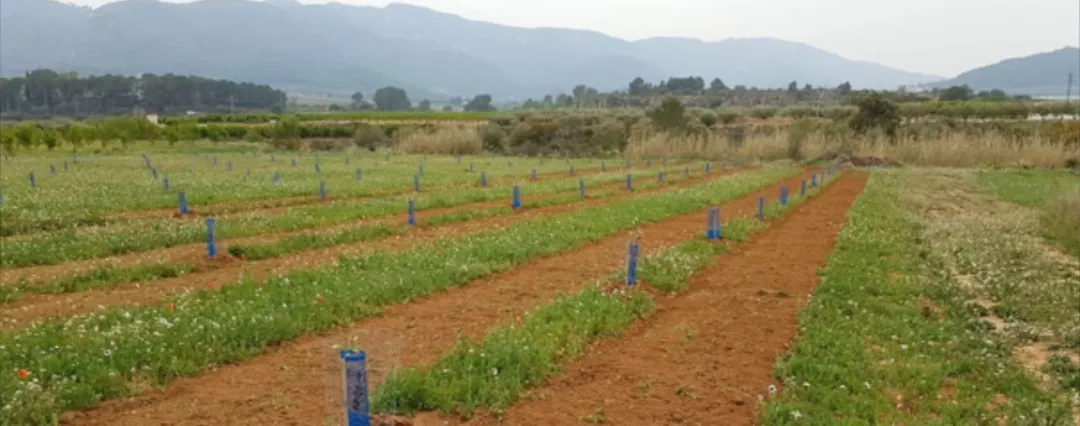General information
Beneficiary type
- Non-profit organisation
Summary
Bioterreta Custodia Agraria began its work in 2016 as the structural problem of land abandonment in the Valencian countryside of Spain began to emerge as a key issue. Bioterreta is an interdisciplinary entrepreneurial initiative that addresses the problem of land abandonment in rural areas through collaborative networking and by taking land into custody for the common good. It addresses issues such as how to continue or resume agricultural activity on farms where owners are unable to work the land but are unwilling to part with it. Current agrarian legislation and regulations informed the design of a so-called ‘custody agreement’ based on rural leasing laws and partnerships benefitting landowners, the environment and food production.
Throughout the project, collaboration was key, from the creation of a network of abandoned plots to the interconnection of small food industries and the sharing of tools and machinery with other actors.
Results
- A total of 107 456 m2 of land has been reclaimed.
- 924 trees were planted.
- 1 243 trees were rehabilitated.
- 42 custody agreements were made, representing a validated integrated model of agricultural custody and forming an agricultural organisational cluster (COA).
- Organic certification was obtained for the crops of the recovered plots under custody.
- With the implementation of new processing technologies, the project has contributed to increased profitability of the products of small agricultural plots and has also supported job creation and the development of circular economy approaches.

Promoter
Jordi López Estornell / Asociación Bioterreta Custodia Agraria
Funding
Direct payments - CAP single application and conversion and maintenance aid of the plots into organic under CAP 2023
Total budget: 148 119 (EUR)
EAGF: 2 146 (EUR)
National/Regional: 1 248 (EUR)
Private/own: 142 036 (EUR)
Other sources: 2 689 (EUR)
Resources
Documents
Links
Context
The loss of agricultural land through abandonment is a structural problem in the Valencian countryside which, in 2016, had the highest rate of abandoned land in Spain with more than 160 000 hectares lost. It was then that the entrepreneurial initiative Bioterreta Custodia Agraria began to take shape.
The project was carried out in the Central Regions of the Autonomous Community of Valencia, a territory with more than half a million inhabitants in the north of the Alicante province and the south of Valencia. The project's headquarters are located in the municipality of La Pobla del Duc (2 537 inhabitants), an area of high agricultural activity that is witnessing an increasing level of land abandonment.
It became clear that an analysis of the situation of land abandonment was needed in order to obtain a more comprehensive understanding of the issue. The Bioterreta project was conceived as a multi-purpose tool addressing and connecting six thematic pillars to generate a shared value system (agroecology, circular economy, land stewardship, food, applied technology and networking). This holistic approach - integrating socio-economic, environmental and cultural concerns - aimed to produce effective mechanisms for land recovery that would curb the widespread abandonment of land.
Objectives
The main objective of the project was to reduce the rate of agricultural land abandonment via a new agrarian model/tool that would reactivate the rural economy and attract young people, women, workers and agricultural technicians to stay in or relocate to rural areas.
Activities
In line with the land custody model, a service was offered to all landowners who could not work their land anymore. A custodial entity carried out planting, maintenance, and conversion to organic crops, thus recovering and recultivating the land. The custodial entity worked in accordance with agroecological principles supported by a circular economy strategy.
The project was accompanied by knowledge transfer workshops and the creation of a network of transformation centres. In addition, a number of applied technologies were used in the management of the plots in custody. These included remote controlled robots and drones, silent work machinery, satellites, sensory and phenological observation tools, and augmented reality.
The project also worked with graduate students in agricultural engineering and environmental sciences, as well as with vocational training students from the food sector. The young people participated in all the volunteer activities and received continuous multi-purpose training.
Overall, the project networked and collaborated extensively to establish relationships and undertake activities that would capture the knowledge of people from different areas. This involved scenario building workshops where participants shared their creativity and problem solving skills. They collectively addressed core tasks such as creating a network of abandoned plots and interconnected small food industries, as well as organising the sharing of tools and machinery.
Key stakeholders included the municipal councils of the regions attached to the land bank of the Provincial Council of Valencia (Banc de Terres).
Project activities included:
- Planting olive trees in abandoned fields (in 2017). This was continued and expanded in the following two years to include more olive trees, almond trees and vegetables, followed by the conversion of cultivation plots to organic certification (2018-2019).
- Over the following two years, from 2020 to 2021, the fruit and other trees in the region were maintained with CAP aid.
- Further CAP funds were received from 2021 to 2023 for converting all plots to organic agriculture and achieving certification.
Main results
The main results can be summarised as follows:
- A total of 10.74 hectares of land were reclaimed.
- 924 trees were planted and 1 243 trees were rehabilitated.
- 42 custody agreements were made representing a validated integrated model of agricultural custody and forming an agricultural organisational cluster (COA).
- The crops of the recovered plots under custody received organic certification (CAE PV7805 certification of ecological agriculture for vegetable production).
- Through the implementation of new processing technologies, the project has contributed to the increased profitability of small abandoned agricultural plots, supported job creation and developed circular economy approaches.
- Additional initiatives included the regeneration of a number of small food facilities that were at risk, including an artisan vegetable preserving business.
- Overall, the project achieved a high degree of collaboration with farmers, owners of land in custody, agricultural cooperatives, agroforestry and food companies, and many local volunteers.
- The project further supported the creation of the first Garrofó Valencià Producers Association, a Phenological Station of the Aemet Phenological Observers Network, and a collaborative, shared network of food workers.
- The project also resulted in further initiatives, such as the creation of an ecological seed bank to protect traditional varieties, zero food waste actions, and a collaboration with a sustainable food programme.
Key lessons
- Stay focused on building solutions based on careful and considered observation of the problems faced in rural areas. Applying a critical view of so-called 'system failures' can usefully inform an iterative approach to verification through project work. This project has shown that it is possible to achieve real impact by doing things differently and applying a disruptive vision.
- Ensure that a preliminary operational, economic and financial study is undertaken to obtain robust arguments for support since it is difficult to make the case for projects of this type in the current climate. In Spain, there are no auxiliary industries in the municipalities linked to agricultural production, which makes it difficult to demonstrate the value of the products obtained. At the same time, there is still a great opportunity to support the return of work and food production to the countryside if we start to think about things in a different way.
An intelligent and social project so necessary in our towns.
An association manages to recover 10.7 hectares of abandoned crops in the Vall d' Albaida in four years.
Bioterreta, land custody as a management tool for the recovery of abandoned land in La Vall d'Albaida.
